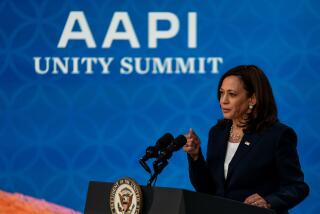Asian Americans Will Not Become a Wedge Group
This year, three promotions have brought wide praise: the appointment of Ming Chin to the California Supreme Court, the promotion of Paul Kim to be the first Asian American captain in the Los Angeles Police Department and the elevation of Fred Lau to be the first Asian American police chief of San Francisco. All three are highly respected by their peers and by any measure are clearly qualified.
Critics of affirmative action rush to assert that promotions like these demonstrate why affirmative action is unnecessary. Indeed, Asian Americans are being used by some as a wedge group--a minority that having progressed on âmerit,â disproves the need for affirmative action.
On the contrary, the appointment of Chin, Kim and Lau urge us to consider the benefits, indeed, the necessity of affirmative action.
Kim, Lau and Chin are representative of thousands of qualified Asian Americans for whom affirmative action opened doors that continue to be closed by racial discrimination and bias. Many talented Asian Americans are hired, promoted or awarded public contracts because affirmative action programs remove the intractable barriers that prevent fair consideration of their talents. Twenty years ago, Asian Americans were virtually shut out of the San Francisco Police Department--fewer than five officers were part of the force, although Asians were one of the largest minority groups in the city. As a result of affirmative action, the police department now has nearly 300 Asian American officers.
Beneficiaries of affirmative action are not hired as part of a quota system but because affirmative action encourages employers to recognize the merits of people they would not normally consider. Moreover, the culture of inclusion fostered by affirmative action has spawned the development of broader complementary programs in workplaces and schools that urge us to value the full ethnic, racial and gender diversity of our society.
Yet even with the success of some affirmative action programs, Asian Americans are still severely underrepresented at entry level and senior positions in many fields. Despite being 10% of the Los Angeles population, Asian Americans constitute only 4.6% of the LAPD. In the judiciary, 1993 figures show Asian Americans holding only 36 of the 1,402 California state trial court judge positions.
Affirmative action is also a mechanism by which minorities and women can challenge the ever-present glass ceiling. âPrejudice against minorities and white women continues to be the single most important barrier to their advancement,â stated the bipartisan federal Glass Ceiling Commission, which recommended the expansion of affirmative action programs. Indeed, pervasive stereotypes of Asian Americans as unassertive or lacking in leadership skills have consigned many to dead-end careers. Many Asian American women confront the additional preconception as being submissive or exotic figures.
Because subjective judgments are inevitably part of promotion decisions, traditional antidiscrimination laws are ill-suited to remedy exclusionary employment practices; affirmative action provides proactive tools to eliminate them.
Affirmative action benefits not only individuals and companies but all of society. Asian Americans in law enforcement improve public safety by using their bilingual or cultural skills to tackle Asian gang violence and to serve the immigrant and other communities. Public health for all is protected when bilingual health workers can accurately diagnose communicable diseases.
These benefits will be eliminated if the so-called âCalifornia civil rights initiativeâ is passed. The CCRI would eradicate public sector programs that equalize opportunities for minorities and women. Not only would goal setting be prohibited as an illegal âpreference,â but effective linguistic and cultural methods of outreach and recruitment would be dismantled. Not only would progress reviews of hiring and promotions be eliminated, even successful training and mentoring programs would be challenged. Finally, the CCRI does nothing to remove preferences for the wealthy and well-connected, and worse, will eliminate key protections against sex discrimination.
Reviews of existing affirmative action programs are in order to ensure fairness, quality, effectiveness and to include groups that have suffered discrimination but have been overlooked. Reconsideration of programs should be made when equal opportunity is achieved. But the wholesale elimination of affirmative action will be devastating.
On our journey toward true equality, Asian Americans and all Californians will benefit by embracing the premise that diversity and excellence go hand in hand. We should not take a U-turn toward exclusion. The agenda of inclusion begins with defeating the CCRI.
More to Read
Sign up for Essential California
The most important California stories and recommendations in your inbox every morning.
You may occasionally receive promotional content from the Los Angeles Times.










